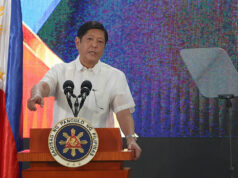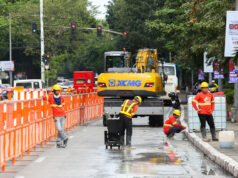Chinese leader on state visit today
By Arjay L. Balinbin, Reporter
MALACAÑANG lauded the Chinese government for its “continued efforts” to promote regional “peace and stability,” as Chinese President Xi Jinping is expected to arrive today, Nov. 20, in a historic, two-day official visit.
According to a Palace advisory on Monday, Nov. 19, the welcome ceremony for Mr. Xi will be held at the Kalayaan Grounds in Malacañang on Tuesday afternoon. This will be followed by the signing of the guestbook, expanded bilateral meeting, witnessing of the signing or exchange of agreement, joint press statements, restricted meeting and exchange of gifts, and a state banquet.
On the second day, there will be a joint call with House Speaker Gloria M. Arroyo and Senate President Vicente C. Sotto III at the Shangri-La Hotel in Taguig City.
Mr. Xi is scheduled to fly back to China on Wednesday afternoon.
Sought for comment, international studies professor Renato C. de Castro of De La Salle University said in a phone interview: “The visit is supposed to be the culmination of the Philippines’ pivot to China that President Duterte declared in 2016.”
In his statement on Monday, Presidential Spokesperson and Chief Presidential Legal Counsel Salvador S. Panelo said: “We laud President Xi for China’s continued efforts to promote peace and stability in our region, through dialogues and consultations in handling the South China Sea issue….”
But for Mr. de Castro, Mr. Panelo’s statement is “basically based on the Chinese notion on how peace should be achieved in the region.” He added that for China, peace will be achieved if countries like the United States, Japan, Australia will be “pushed out” of the region, and “countries should accept China’s maritime expansion in the South China Sea without asking any question.”
“So the Chinese notion of peace can be equated to the peace of cemeteries or the peace of penitentiaries wherein regional countries would have to accept Chinese maritime expansion in the short term and, of course, Chinese regional hegemony in the long run,” Mr. de Castro said.
Mr. de Castro also said, “There’s always a declaration that there will be a dramatic change, and it remains to be seen.”
This is Mr. Xi’s first visit to the country under a friendlier atmosphere between the two nations since 2015, when he attended the APEC Leaders’ Meeting in Manila during then president Benigno Simeon C. Aquino III’s administration. In 2016, the Philippines won the country’s arbitration case on Mr. Aquino’s watch against China over its incursion into the West Philippine Sea, with the United Nations (UN) Arbitral Tribunal invalidating China’s “nine-dash line” claim.
In his arrival statement last Sunday, Mr. Duterte noted that during his participation at the ASEAN Summit in Singapore, he “asserted that aggressive moves by nations” in the South China Sea “can worsen the situation with damage that could be exponential.”
Mr. Duterte “urged stakeholders to desist from adventurism” in the disputed waters.
For Mr. de Castro, the President’s policy is a form of “appeasement” in which the Philippine government “facilitates China’s maritime expansion by setting aside the Permanent Court of Arbitration (PCA) ruling and, at the same time, downgrading the Philippines-United States security relations.”
Mr. Panelo for his part said, “Owing to President Rodrigo Roa Duterte’s cautious, pragmatic and diplomatic yet independent foreign policy, we anticipate more opportunities to forge better cooperation and friendship with China.”
Mr. de Castro said this “independent foreign policy has been the policy of the previous administration,” but the President “basically intends to unravel it.”
NO WORK IN MANILA
For his part, Manila Mayor Joseph E. Estrada issued an order suspending classes and government work to give way to Mr. Xi’s first day in his state visit.
Work in Manila courts, including the Supreme Court (SC) and Court of Appeals, is also suspended today, the SC Public Information Office announced. — with Vann Marlo M. Villegas



